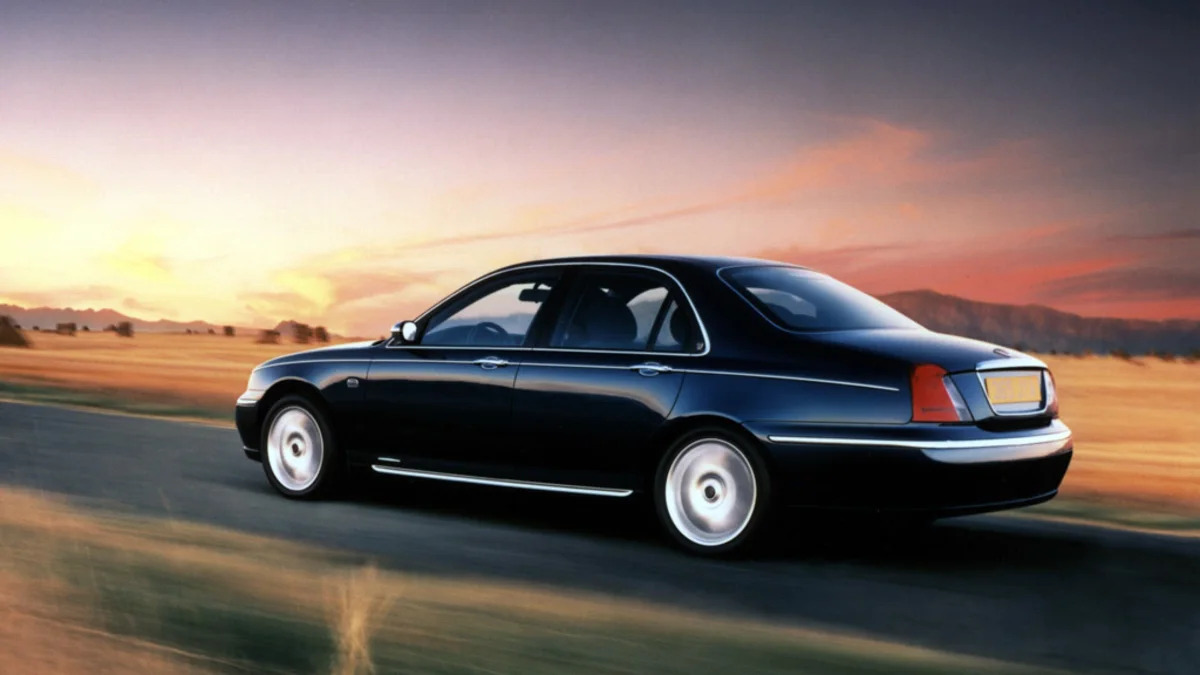Reports are circulating in the automotive media that Jaguar Land Rover is developing a vehicle that's not an SUV. Called the Road Rover, it would be an all-electric luxury car with "some" all-terrain capability, hinting at all wheel drive. Initially, the EV would launch in late 2019, then spawn more models to complete the lineup.
There is also talk about JLR's interest in an outright purchase of an existing luxury car brand to join its portfolio, and that parent company Tata has already given this strategic move the green light. Tata has also reportedly made moves to protect its JLR ownership via acquiring more of its own stock.
All this excitement brings to mind the fact that there once existed an actual Road Rover — the Rover brand. Having evolved into MG Rover before going into administration in 2005 and subsequently reborn in China under SAIC Motor ownership, Rover was a moderately posh British carmaker just beneath the level of prestige that Jaguar offered. For some years, both were part of the same corporation. The last Rover saloons were designed and built with BMW input, and at that point Land Rover had already become part of Ford, almost a decade after Jaguar did. Ford's tenure with Land Rover lasted from 2000 to 2008, when Tata bought the British brand — along with the Rover name.
Would it just make sense to badge the road car Rover, with no Road or Land affixed to it? Rover's slovenly demise is more than a decade old now, but there's plenty of valuable history still embedded in the long-shelved Viking ship logo. Cast aside memories of Sterling-badged Honda Legend platform siblings and unattractively Federalized SD1 series cars, and take whatever good the 1999-2005 Rover 75 brought to the table — maybe it's time for Rover to be reborn in the current Jaguar Land Rover family.
According to Autocar, the first Road Rover would be developed in tandem with the next-generation Jaguar XJ, so they would share an aluminum architecture suitable for both internal combustion engines and battery electric technology, depending of the model. If anything, there is delicious irony to this: The 1980s XJ generation that Jaguar spent decades developing was claimed to be engineered in such a way that the occasional stablemate Rover's Buick-derived 3,5-liter V8 wouldn't have fit in its engine bay — to preserve the Jaguar bloodline. To have the new XJ and a Rover cross paths again would only be fitting.
Related Video:
There is also talk about JLR's interest in an outright purchase of an existing luxury car brand to join its portfolio, and that parent company Tata has already given this strategic move the green light. Tata has also reportedly made moves to protect its JLR ownership via acquiring more of its own stock.
All this excitement brings to mind the fact that there once existed an actual Road Rover — the Rover brand. Having evolved into MG Rover before going into administration in 2005 and subsequently reborn in China under SAIC Motor ownership, Rover was a moderately posh British carmaker just beneath the level of prestige that Jaguar offered. For some years, both were part of the same corporation. The last Rover saloons were designed and built with BMW input, and at that point Land Rover had already become part of Ford, almost a decade after Jaguar did. Ford's tenure with Land Rover lasted from 2000 to 2008, when Tata bought the British brand — along with the Rover name.
Would it just make sense to badge the road car Rover, with no Road or Land affixed to it? Rover's slovenly demise is more than a decade old now, but there's plenty of valuable history still embedded in the long-shelved Viking ship logo. Cast aside memories of Sterling-badged Honda Legend platform siblings and unattractively Federalized SD1 series cars, and take whatever good the 1999-2005 Rover 75 brought to the table — maybe it's time for Rover to be reborn in the current Jaguar Land Rover family.
According to Autocar, the first Road Rover would be developed in tandem with the next-generation Jaguar XJ, so they would share an aluminum architecture suitable for both internal combustion engines and battery electric technology, depending of the model. If anything, there is delicious irony to this: The 1980s XJ generation that Jaguar spent decades developing was claimed to be engineered in such a way that the occasional stablemate Rover's Buick-derived 3,5-liter V8 wouldn't have fit in its engine bay — to preserve the Jaguar bloodline. To have the new XJ and a Rover cross paths again would only be fitting.
Related Video:







Sign in to post
Please sign in to leave a comment.
Continue